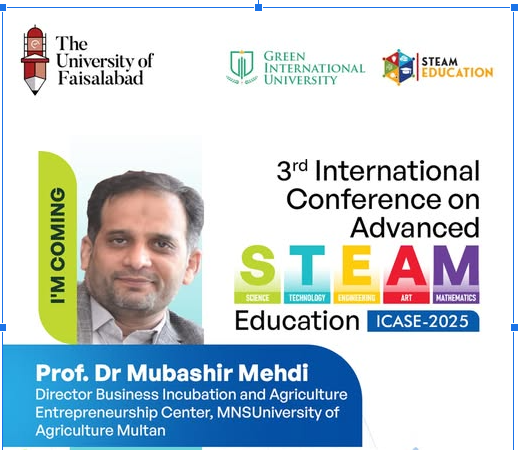E-Commerce: Practice-Based Learning
Venue 4 – Room 001
Track: National Business School 2
Chair: Prof. Dr. Mubashir Mehdi, MNS University of Agriculture, Multan
Co-Chair: Dr. Muhammad Rizwan Choudhry, The University of Faisalabad
Introduction
In a world dominated by digital transformation, E-Commerce has become more than an online buying and selling mechanism—it has evolved into a dynamic ecosystem driven by innovation, data, and practical skills. Recognizing this shift, the STEAM Conference 2025 held a dedicated session titled “E-Commerce: Practice-Based Learning” at Room 001, Venue 4, under the National Business School (2) track.
Led by Prof. Dr. Mubashir Mehdi, a distinguished academic in agricultural entrepreneurship and digital trade, alongside Co-Chair Dr. Muhammad Rizwan Choudhry from The University of Faisalabad, the session focused on integrating hands-on learning, digital innovation, and real-world applications in e-commerce education. Their combined leadership set a powerful tone for exploring how students, entrepreneurs, and institutions can strengthen Pakistan’s digital commerce landscape.
Prof. Dr. Mehdi emphasized that e-commerce is no longer theory-based; it demands practical exposure, real-time analytics, digital strategy building, and interdisciplinary knowledge, intersecting business, technology, and agriculture. Dr. Rizwan highlighted the critical role of local industries and universities in preparing graduates who can operate global e-commerce platforms and contribute to Pakistan’s rapidly evolving digital economy.
Invited Talks and Key Contributions
Cultivating Innovation Through STEAM in Agricultural Business
Zhou Deyi – Huazhong Agricultural University, Wuhan, China
Zhou’s invited talk explored how STEAM education can be integrated with agricultural e-commerce to develop innovative, value-added agribusiness models. He emphasized hands-on learning using digital platforms, data-driven farming, and online value-chain optimization. Zhou highlighted how blending STEAM principles with agriculture helps students design e-commerce solutions tailored for global food markets.
AI and Sustainability in Pakistan’s Food & Health Sectors
Mustafa KAN – Ahi Evran University, Turkiye
Mustafa discussed the transformative role of Artificial Intelligence in promoting a circular economy within the health and food industries. He demonstrated how AI-powered e-commerce tools can reduce waste, optimize supply chains, and introduce sustainable production cycles. His insights showed how Pakistan can use AI-driven platforms to boost environmental sustainability and digital trade.
Geostrategic Shifts in Global Power
Samra Subhani – The University of Faisalabad
Samra presented an analytical overview of China’s rise and the U.S.’s relative decline, exploring how geopolitical shifts influence international trade, e-commerce flows, and global digital markets. She explained why understanding geo-economics is essential for e-commerce learners navigating global supply chains and international business strategies.
Building Sustainable Agricultural Enterprises Through E-Commerce
Naveed Anjum – The University of Faisalabad
Naveed spoke about managing transitions to diversified agricultural businesses using digital tools and online marketplaces. He emphasized that modern farmers must adopt practice-oriented e-commerce models, enabling them to access wider markets, reduce intermediaries, and improve profitability.
Turning Barriers Into Drivers of Circular Economy Practices
Abdullah Hammad – The University of Faisalabad
Abdullah highlighted how family firms in Pakistan can overcome regulatory challenges by adopting digital solutions. He explained how e-commerce, sustainability policies, and circular economy principles can transform constraints into strategic opportunities, particularly in small and medium enterprises.
AI-Powered Diagnostic Tools in Healthcare
Sohail Mansha – The University of Faisalabad
Sohail presented advancements in AI-based dental diagnostics using YOLO models. He demonstrated how smart detection systems can be integrated into telemedicine and online healthcare commerce platforms, bridging medical services and digital marketplaces.
Explainable AI for Digit Classification
Ahmed Shahzad – The University of Faisalabad
Ahmed discussed a LIME-based explainable deep learning framework for digit classification, reinforcing how transparent AI systems enhance trust in digital financial platforms, handwriting recognition systems, and e-commerce authentication tools.
Project Management & Complexity in Business Success
Mehak Rana – The University of Faisalabad
Mehak focused on project management strategies and the impact of organizational complexity on project success. Her research directly connects to e-commerce startups and digital business management, providing frameworks for efficient online business execution.
Employee Innovation Through Digital Skills & E-Leadership
Muhammad Imran Majeed – The University of Faisalabad
Imran emphasized the need for AI digital skills and e-leadership in enhancing employee innovation. He explained how digitally empowered teams drive e-commerce growth, customer engagement, and data-driven decision-making.
Nanomaterials for Plant Disease Diagnosis
Hammad Imran – The University of Faisalabad
Hammad introduced nanotechnology-based solutions for plant disease detection. These innovations can be linked to digital agriculture marketplaces where farmers access rapid diagnostic tools and e-commerce platforms for agri-solutions.
Nanomaterials & Smart Agricultural Systems
Muhammad Shahid – Government College University Faisalabad
Shahid expanded on the role of nanomaterials in plant disease control. His insights underscored the importance of integrating scientific research with commercial digital platforms, enabling farmers to access advanced disease management products through e-commerce channels.
Conclusion
The “E-Commerce: Practice-Based Learning” session highlighted the necessity of bridging theoretical education with real-world digital skills. Under the leadership of Prof. Dr. Mubashir Mehdi and Dr. Muhammad Rizwan Choudhry, the session showcased diverse research—from AI innovations and geopolitical analysis to agricultural entrepreneurship and health tech.
The collective message was clear:
E-commerce thrives when learners are equipped with hands-on digital skills, interdisciplinary knowledge, and innovative thinking.
As Pakistan expands its digital economy, practice-based e-commerce education will play a foundational role in shaping the next generation of business leaders and innovators.

